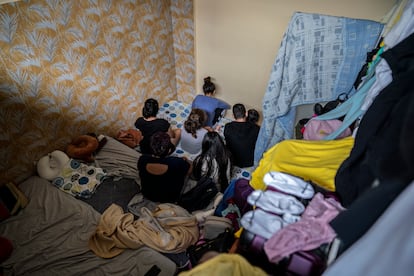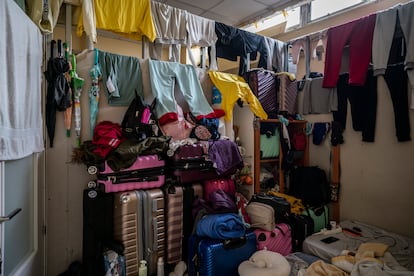The dark side of renting in Madrid: Four Latin American families pay €2,500 a month to stay in a 40-meter basement
20 people, including two little girls and two babies, reside in a windowless, unheated cellar with only one bathroom for everyone

If the woman in this story could turn back time and start over, she never would have trusted the lady who told her that finding an apartment in Madrid was easy. She figured that it would take about 10 days to settle her family in the Spanish capital; she would use her life savings to do so. That time would be enough to look for a job and recover the money she had spent buying five plane tickets from Lima, Peru, for her three daughters, her mother and herself. She dreamt that her eldest daughter, 18 years old, could finally go to college and her two younger daughters could attend school, and that she could stop explaining to them that in her country money or connections were the only way to avoid serving the rich. But last Friday they had cocoa mixed with water for breakfast in a damp, windowless, airless basement measuring less than 40 square meters (430.56 square feet). 15 other Colombians, Venezuelans and Peruvians, including two babies under a year old, live there as well. From this suffocating corner of the Usera district, in the south of the capital, for which the residents pay a total of €2,500 ($2656.62) a month, there is no trace of “the new Miami,” as the hundreds of Latin American millionaires who have settled in the wealthy district of Salamanca have nicknamed Madrid.
The woman in this story wants to remain anonymous because her greatest fear these days is that they will all be thrown out of the uninhabitable basement, which has also become their only refuge. A few days before, her eldest daughter was figuring out the best park bench to spend the night. Her middle daughter was thinking about how to place the umbrellas to avoid getting wet in the Madrid downpour. And her 8-year-old daughter was listening to reggaeton on her cell phone, distracted from the anguish and despair all around her. “I never would have thought that I would find myself having to explain to my little girl that we had to sleep in the street,” she says.
-I don’t care about that, Mom.
It all started two weeks ago. She arrived with her daughters and her mother at an Airbnb in Madrid’s Puente de Vallecas neighborhood. Her niece and her niece’s boyfriend, 24 and 22, respectively, had already been living in Spain for eight months and joined them at the apartment. The seven of them searched night and day for a house in the capital; they walked down every street and read every ad they could find on the internet. They had 10 days to find a place. They went to real estate agencies and asked around on websites. But all the ads mentioned conditions that none of the five adults could meet: the person’s last two paychecks, a permanent job, a salary that would allow them to spend no more than a third of their wages on rent, a deposit of 2 months’ rent and additional guarantees.

When landlords heard the woman’s accent, the requirements increased: more pay slips, a heftier deposit; some even wanted a payment just to show the apartment. “We can’t trust them, what if they can’t pay?” “Ah, there are children, even worse,” “How am I going to live with myself if I have to throw little girls out onto the street?” But they were already out on the street. They had a budget of €800 ($849.78) a month and savings that allowed them to pay six months in advance. It was impossible.
So, they turned to Facebook. They searched pages like “apartments and rooms for rent in Madrid” and “places for rent without documents.” One woman asked the family to deposit €800 ($849.78) into her account just to show them the place; she told them that she was on her honeymoon, made a video call and sent them a photo of her ID. She almost succeeded. Another person offered them a cabin in Arganda del Rey in the Spanish countryside. “You have to have a car. You and your husband,” the advertiser warned. “How much would renting the cabin cost?” the niece asked. “It would be free. On the condition that you take care of and fix up the farm and the cabin, install a solar panel and build a septic tank,” the advertiser replied. The place lacked electricity and running water; he suggested that they live there and work for him in exchange for a roof over their heads 40 kilometers from downtown Madrid. “If you’re not interested, but you know of a Peruvian friend or relative who would like to live in the countryside, let me know.”
-How can it be that the minimum wage in Spain is €950 ($1,009.12) but there are no apartments in Madrid for less than €700 ($743.59)? How do people do it?” asks the niece.
When they were about to be out on the streets with their belongings and had no idea what to do, a man wrote them a Facebook message telling them to enter the first floor of Usera that very day. At the time, they all believed that it was a miracle. “Then we got suspicious, because he told us we had to go in at night so no one would see us,” the niece says. And the seven of them went in--”like criminals,” says the woman’s mother, 62—to the room in which they have been living for two weeks. It wasn’t until the next morning, at breakfast, that they discovered that many other people, just like them, were living in the four-room basement. The residents couldn’t even all fit in the kitchen at the same time.
The head of the family, her daughters, mother, niece and her niece’s boyfriend squeezed into the only free space: an 8.60-square-meter (92.57-square-foot) room with plasterboard walls, installed in a corner of the kitchen; the flimsy walls don’t even reach the ceiling. The man who claims to be their landlord charges them €700 ($743.59) a month to live there. At night, they have to move their suitcases so they can put two 90-cm mattresses and a full mattress; they must all squeeze in there, and it is so crowded that the door won’t open. Rainwater that has accumulated in the building’s inner courtyard leaks into the basement from what used to be a high window, which is now boarded up with wood and duct tape. The hallway leading to the only bathroom is waterlogged. Mold has eaten away half of one of the shower walls. The moisture soaks one’s lungs, and it is hard to breathe. The only way to let air in is to open the street door that leads to the landing.
€2,500 for a windowless basement
A Colombian family also lives in the basement in another room next to the kitchen. That family recently arrived and started living in the cellar three months ago. There are seven Colombian family members, including two children, one of whom is under a year old; they pay another €700 ($743.59) in rent. At the entrance, there are two 3-square-meter (32.3-square-foot) rooms in which only a twin-sized bed can fit. In one of those beds, a couple sleeps with their 6-month-old baby. The woman stays there all day with her little girl, while the husband goes out to look for construction work. “I think I am depressed; some days, I can’t even get out of bed,” she says. A Venezuelan couple lives in the room next door with their 20-day-old baby girl. All told, the residents pay €2,500 ($2656.62) a month for this uninhabitable space.
In the Salamanca neighborhood, one of Madrid’s richest areas, accents similar to the ones heard in the basement imply investment, but in Usera, the neighborhood with the lowest per-capita income in the capital, they mean misery. This is the dark side of the “new Miami,” a nickname bestowed on the city because of the number of Latin American millionaires who have chosen Madrid as their new place of residence. Wealthy Mexicans, Peruvians, Colombians and Venezuelans eat at the trendy restaurants on Jorge Juan Street, buy clothes and jewelry on Serrano Street and purchase renovated homes at an average of €12,000 ($12,751.80) per square meter. Then there are those who earn no more than €500 a month by cleaning houses or laying bricks.
The “new Miami” can’t be seen from Usera. The working-class Latin Americans who emigrated to give their families a better future become the final link in the cruel chain of the system. Lacking residency and documents, the newly arrived immigrants are stalked by swindlers who seek to take advantage of them. As their savings continue to dwindle, they swell the ranks of soup kitchens, the Red Cross, and parish assistance programs. “If we were in Miami, I would charge three times my hourly rate for taking care of children,” says the Peruvian woman. But here, her under-the-table salary is not even enough for rent. It is barely sufficient for a stifling, unsanitary basement that costs more than what someone with a steady job would pay for an apartment of more than 100 square meters (1076.4 square feet) in the Salamanca neighborhood.
On Friday, part of the basement’s roof fell in while the Peruvian family was sleeping. The wall covering the high basement window collapsed in the rain. The clothes hanging on the plasterboard walls were soaked with black water. The hangers fell on the mattresses in their room, and the mother from Peru felt a rumbling from the small rooms in the entryway. The only natural light the basement has now comes in through the hole created by the bad weather. They know they have to get out of there as soon as possible. “But where would we go?” asks the niece, who has already considered returning to Cantabria with her boyfriend. The head of the household’s eyes fill with tears. Now, her greatest fear is that her daughters will be taken away from her, as a social worker has recommended. “They told us it would be hard, we came prepared for anything. But we never imagined this,” she says.
Sign up for our weekly newsletter to get more English-language news coverage from EL PAÍS USA Edition
Tu suscripción se está usando en otro dispositivo
¿Quieres añadir otro usuario a tu suscripción?
Si continúas leyendo en este dispositivo, no se podrá leer en el otro.
FlechaTu suscripción se está usando en otro dispositivo y solo puedes acceder a EL PAÍS desde un dispositivo a la vez.
Si quieres compartir tu cuenta, cambia tu suscripción a la modalidad Premium, así podrás añadir otro usuario. Cada uno accederá con su propia cuenta de email, lo que os permitirá personalizar vuestra experiencia en EL PAÍS.
¿Tienes una suscripción de empresa? Accede aquí para contratar más cuentas.
En el caso de no saber quién está usando tu cuenta, te recomendamos cambiar tu contraseña aquí.
Si decides continuar compartiendo tu cuenta, este mensaje se mostrará en tu dispositivo y en el de la otra persona que está usando tu cuenta de forma indefinida, afectando a tu experiencia de lectura. Puedes consultar aquí los términos y condiciones de la suscripción digital.









































